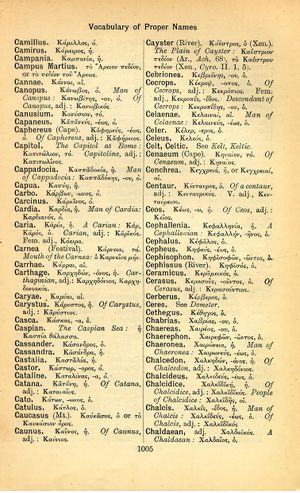Caryae
εἰ πάλιν ἔστι γενέσθαι, ὕπνος σ' ἔ̣χει οὐκ ἐπὶ δηρόν, εἰ δ' οὐκ ἔστιν πάλιν ἐλθεῖν, αἰώ̣νιος ὕπνος → if it is possible for you to be born again, you will fall asleep, briefly; if it is not possible to return — it would be eternal sleep
English > Greek (Woodhouse)
Καρύαι, αἱ.
Latin > English (Lewis & Short)
Căryae: ārum, f., = Καρύαι>,
I a village in Laconia, with a temple of Diana Caryatis (now still Karyes), Liv. 34, 26, 9; 35, 27, 12. —In <number opt="n">sing.</number>: Cărya, Vitr. 1, 1, 5.—
II Hence,
A Căryātes, ium, m., the inhabitants of Caryœ, Vitr. 1, 1 bis.—
B Căryā-tis, ĭdis, f., = Καρυᾶτις.
1 An epithet of Diana, Serv. ad Verg. E. 8, 30.—
2 Căry-ātĭdes, the maidens of Caryœ serving in the temple of Diana, a statue of Praxiteles, Plin. 36, 5, 4, § 23.—
(b) In architecture, female figures used instead of columns in buildings, Caryatides, Vitr. 1, 1, 5 (v. the representation of such a Caryatide from the temple of Pallas Polias, at Athens, in O. Müller, Denkm. d. alt. Kunst, 101, and Dict. of Antiq.).—
3 Căryus, a, um, adj., of Caryœ: Diana, Stat. Th. 4, 225.

